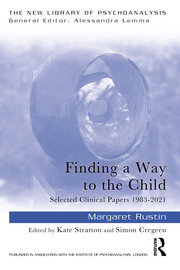Finding a Way to the Child: Selected Clinical Papers 1983-2021

Book Details
- Publisher : Routledge
- Published : 2023
- Cover : Paperback
- Pages : 270
- Category :
Psychoanalysis - Category 2 :
Child and Adolescent Studies - Catalogue No : 96995
- ISBN 13 : 9781032351568
- ISBN 10 : 9781032351
Reviews and Endorsements
'This long overdue volume of Margaret Rustin's papers radiates her legendary clarity of mind and thought. As has been the case for a very long time, Margaret is the "go to" person for an opinion or consultation; this book allows us to "find our way", in perpetuity, to her wise counsel.' - Ricky Emanuel, child, adolescent and adult psychotherapist, London.
'Margaret Rustin's enquiring mind and her emotional receptivity are in constant dialogue in her endeavour to find a way to the child. Thanks to her unique capacity to connect the dimensions of her patients' external reality and their internal objects, and her organic integration of clinical experience and psychoanalytic theory, this book is a precious guide for practitioners, teachers and future generations of child psychotherapists.' - Suzanne Maiello, child, adolescent and adult psychotherapist, Rome.
'This is a marvellous book. It is also a book of critical importance at a time when children's emotional health is a growing concern in this confusing and rapidly changing world. Margaret Rustin is a gifted writer and an unusually gifted psychoanalytic psychotherapist. Finding a Way to the Child is a compelling description of her work with children and adolescents over many years at the Tavistock Clinic. Rustin's vivid and detailed examples of trying to understand in depth the experience of each of her young patients and of finding ways, based on her exploration of psychoanalytic technique, of communicating that understanding in the most helpful way, includes also her examination of the doubts, distress and confusion that she needs to contain. The author understands that life is often difficult for babies and young children, even those raised in the most favourable conditions. Many of the children she sees have some difficulty in their background: illness or death in the family, loss of their national home, racial problems, extreme financial problems, adoption or being taken into care, etc. Some may have no obvious cause of their distress. The second half of the book, about assessment for treatment, deals with how decisions are made about which children will get treatment in this environment of limited resources. Rustin describes the great care that must be taken over these sometimes agonizing decisions, so that even when further treatment can't be offered, the child, and often the parents, can find the assessment process therapeutic in itself. Rustin's rich, detailed and clear presentations of her life's work will be of immense interest and help to colleagues in her own and related fields, experienced professionals and beginners alike; and, indeed, to anyone interested in children's emotional lives.' - Priscilla Roth, British Psychoanalytical Society, London.

